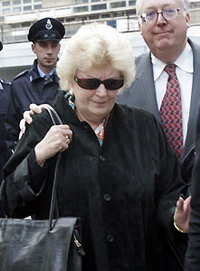J Paul Getty Museum curator Marion True to return 40 contested artifacts
Italian officials will drop a civil lawsuit in the trial of former J. Paul Getty Museum curator Marion True who signed a deal to return 40 contested artifacts.

State lawyers will withdraw the civil lawsuit when the two-year-old trial resumes Wednesday following a summer break. But officials said dropping the civil charges will not stop criminal proceedings against True, who is accused of knowingly acquiring ancient treasures that Italy maintains were stolen or dug up illegally and smuggled out of the country.
True denies wrongdoing, and senior government lawyer Maurizio Fiorilli said the deal signed Tuesday could work in her favor.
"True's position is certainly less serious ... in this case, returning the artifacts can be considered an extenuating circumstance," Fiorilli told reporters after the deal was signed at the Culture Ministry.
Fiorilli said the civil lawsuit against True's co-defendant, American art dealer Robert Hecht, remains since the charges against Hecht include the alleged sale of other objects on the international market. Hecht also denies wrongdoing.
Getty Director Michael Brand said he hopes the agreement, reached last month after a year of often-stalled negotiations, will put an end to the trial, which is part of a wider campaign by Italy to crack down on the illegal antiquities market. Already, Italy has struck deals with two U.S. museums for the return of ancient Greek, Roman and Etruscan artifacts.
"We certainly hope, on the Getty side, that this new spirit of collaboration will lead to the end of that case and will allow the scholar to get back to her life, get back to her research," Brand said after signing the agreement with ministry officials.
All but one of the ancient treasures covered by the deal will be transferred to Italy by the end of the year. The last and most prized work, a 5th century B.C. statue of the goddess Aphrodite, will remain at the Getty until 2010.
"The agreement allows us to close a long discussion with the Getty but also to set an example at an international level" for other museums and the art market, Culture Minister Francesco Rutelli said.
Italian authorities have already signed separate deals with New York's Metropolitan Museum of Art and Boston's Museum of Fine Arts for the return of a total of 34 artifacts - including Hellenistic silverware, Etruscan vases and Roman statues - in exchange for loans of other treasures.
Under the 18-page Getty deal, Italy will loan the museum other precious artifacts for up to four years each. The agreement also provides for widespread cultural cooperation including research projects and joint exhibitions.
Brand said that the departure of important pieces like the statue of Aphrodite will leave gaps in the museum's collection, which includes about 1,200 artifacts on display, but added that Italy's long-term loans will help the Getty cope with the losses.
"Italy has made it clear that they will help us fill the Aphrodite gap with a work of equal significance," Brand said. "I am very sad to see her go; also we are very excited about the sorts of objects that could come in her place."
Italian prosecutors believe the Aphrodite, which the Getty bought for US$18 million in 1988, was looted from the ruins of the ancient Greek settlement of Morgantina in Sicily. Italian law makes all antiquities found in the country state property.
Rutelli declined to say which artifacts Italy will loan to the Getty as the museum returns the disputed treasures.
Fiorilli, the government lawyer, said that under the deal, the Getty will receive 50 artifacts seized by police in raids on looters, in what he said is a symbolic gesture that shows that Italy's crackdown on the illegal international trade is balanced by an increasing desire to share its cultural heritage with the world.
Getty attorney Luis Li said that the deal includes no admission of guilt, and the museum has always denied knowingly buying illegally obtained objects.
True's trial grew out of an investigation into an Italian art dealer, Giacomo Medici, who has been sentenced to a 10-year prison term on art trafficking charges. Medici is appealing his conviction.
In a 1995 raid on Medici's offices in Switzerland, police found a trove of artifacts and photos of antiquities, many still in pieces and covered with mud, which authorities later traced to museums worldwide.
In Los Angeles, Ron Hartwig, a spokesman for the Getty Trust in Los Angeles, said three artifacts held by the Getty are still in dispute, including an ancient bronze statue dubbed "Victorious Youth," but the agreement provides for the Getty and the Italian government to discuss those claims.
Hartwig said the Getty would continue to pay for True's defense even though the institution is not directly involved in the criminal case.
Subscribe to Pravda.Ru Telegram channel, Facebook, RSS!


